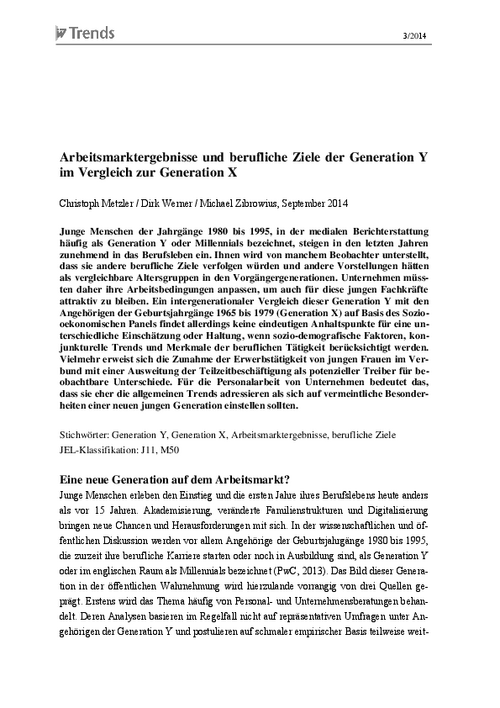In the last few years young people born between 1980 to 1995, frequently referred to in the media as Generation Y or Millennials, have been joining the workforce in increasing num-bers. Some observers assume that they have other career goals and a different vision than the preceding cohort and consequently advise companies wishing to remain attractive to these young skilled workers to adapt their working conditions accordingly. However, a comparison based on the Socio-Economic Panel of this Generation Y with their predecessors in Generation X ( those born between 1965 to 1979) finds that when socio-demographic factors, economic trends and the nature of their work are taken into account there are no unambiguous signs of different perceptions or attitudes. The probable reason for the observable differences proves rather to be an increase in the proportion of women in the workforce combined with an increase in part-time employment. This suggests that HR managers should be responding more to general trends and less to the supposed peculi-arities of a new generation of young employees.

Labour Market Results and the Career Goals of Generation Y compared with those of Generation X
IW-Trends


Christoph Metzler / Dirk Werner / Michael Zibrowius: Arbeitsmarktergebnisse und berufliche Ziele der Generation Y im Vergleich zur Generation X
IW-Trends

More on the topic

Leadership in transformation: Megatrends and management as a driver of change
Leadership dynamics in companies are subject to constant change in order to meet the challenges of their time. Today, the greatest influences result from developments such as demographic change, globalization, individualization, structural change and ...
IW
Orphaned executive chairs in German companies
In 2023, half of the companies in Germany reported increasing problems in filling vacancies for management positions because employees are not aiming for a career. Larger companies are less affected than small companies.
IW